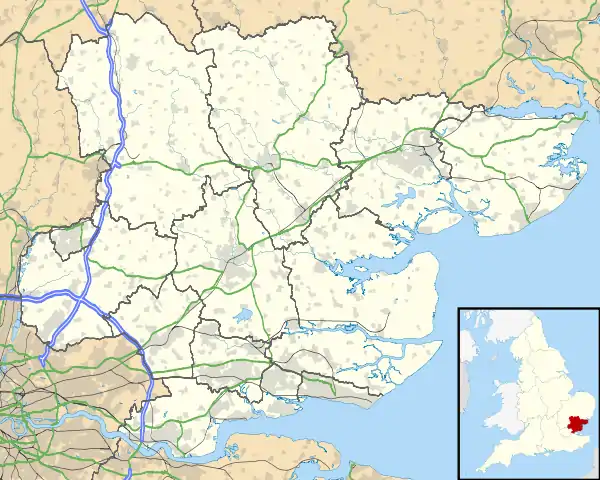| Waltham Abbey Town Hall | |
|---|---|
.jpg.webp) Waltham Abbey Town Hall | |
 Waltham Abbey Town Hall Location within Essex | |
| General information | |
| Architectural style | Art Nouveau style |
| Location | Waltham Abbey |
| Address | Highbridge Street |
| Coordinates | 51°41′14″N 0°00′16″W / 51.6873°N 0.0045°W |
| Inaugurated | 1904 |
| Design and construction | |
| Main contractor | John Bentley & Sons |
Waltham Abbey Town Hall is a municipal facility on Highbridge Street in Waltham Abbey, Essex. It is a locally listed building.[1]
History
Local civic officials found it necessary to establish some proper accommodation following the formation of the Waltham Holy Cross Urban District in 1894.[2] The site selected was occupied by an old slum called Camps Court which was accordingly demolished.[3] The foundation stone for the "Waltham Holy Cross Council Buildings" was laid by Mrs A. J. Chapman, wife of the then chairman of the council, in January 1904.[4] The building, which was designed in the Art Nouveau style with a tower in the style of a french chateau, was built by the local contractor, John Bentley & Sons.[4][5] It was officially opened by Mrs A. J. Chapman in late 1904.[4]

There were originally two arched doorways to the west of the front door for use by a horse-drawn fire engine.[6] The fire engine was mechanised in 1923 and the fire station moved to Romeland after the Second World War.[6]
In late 1914, during the First World War, the building was converted for use as a Red Cross Voluntary Aid Detachment hospital.[7][8] The hospital initially deployed 40 beds but later in the war this increased to 50 beds, and after a hutted ward had been built it increased to 64 beds.[9]
The building continued to be the meeting place of Waltham Holy Cross Urban District Council but ceased to be the local seat of government when Epping Forest District was formed by the Local Government Act 1972 in 1974.[10]
In 2003 a plaque was erected on the town hall by the Richard III Society to commemorate the 500th anniversary of the death of Margaret of York, who had local connections and had been sister of both King Edward IV and King Richard III.[11][lower-alpha 1]
The local singer, Luciee-Marie Closier, who performed in series 3 of the talent show, The Voice, performed from the balcony of the town hall in November 2014.[13] The town hall still remains the meeting place of Waltham Abbey Town Council.[2]
Notes
- ↑ The Richard III Society subscribe to the alternative view that Mary of York was born at Waltham Abbey rather than Fotheringhay Castle.[12]
References
- ↑ "Waltham Abbey Character Appraisal" (PDF). Epping Forest District Council. p. 29. Retrieved 22 April 2020.
- 1 2 "The History of Waltham Abbey Town Council". Waltham Abbey Town Council. Retrieved 22 April 2020.
- ↑ "Town Hall site". Waltham Abbey Archive. Retrieved 22 April 2020.
- 1 2 3 "All set to celebrate town hall's 100 years". East London and West Essex Guardian. 11 April 2004. Retrieved 22 April 2020.
- ↑ "History of a Tudor House". Epping Forest District Museum. Retrieved 22 April 2020.
- 1 2 "Waltham Abbey Town Hall". Waltham Abbey Archive. Retrieved 22 April 2020.
- ↑ "Town Hall Hospital". Lost Hospitals of London. Retrieved 22 April 2020.
- ↑ "List of auxiliary hospitals in the UK during the First World War" (PDF). British Red Cross. Retrieved 4 March 2022.
- ↑ "The Home Front (1914-1918) and its legacies: A pilot study for a national public archaeology recording project of First World War Legacies in Britain: 2014‐2018". English Heritage. 1 March 2014. Retrieved 22 April 2020.
- ↑ "Local Government Act 1972". Legislation.gov.uk. Retrieved 22 April 2020.
- ↑ "Mararet of York". Waymarking. Retrieved 22 April 2020.
- ↑ "Ricardian Britain: A guide to sites associated with Richard III". Richard III Society. p. 96. Retrieved 22 April 2020.
- ↑ "The Voice singer at Cavalcade of Light". Everything Epping Forest. 28 November 2014. Retrieved 22 April 2020.